Business Law Assignment: Interpretation and Exclusion Clauses
VerifiedAdded on 2022/10/10
|7
|1437
|422
Homework Assignment
AI Summary
This business law assignment solution addresses two key legal issues. The first concerns the interpretation of the Ellenbrook National Park (Restriction of Entry) Bill, focusing on the application of statutory interpretation rules such as the golden, mischief, and literal rules, alongside the Acts Interpretation Act 1901 (Cth), to determine whether a ranger can prevent a cyclist from entering the park. The second issue explores exclusion clauses in a contract scenario involving a railway cloakroom, analyzing the validity and implications of such clauses, including liability for breach of contract and negligence, and how these factors affect the extent of the railway's liability in cases of lost or misdelivered property. The solution references legal precedents and provides reasoned conclusions for each scenario.
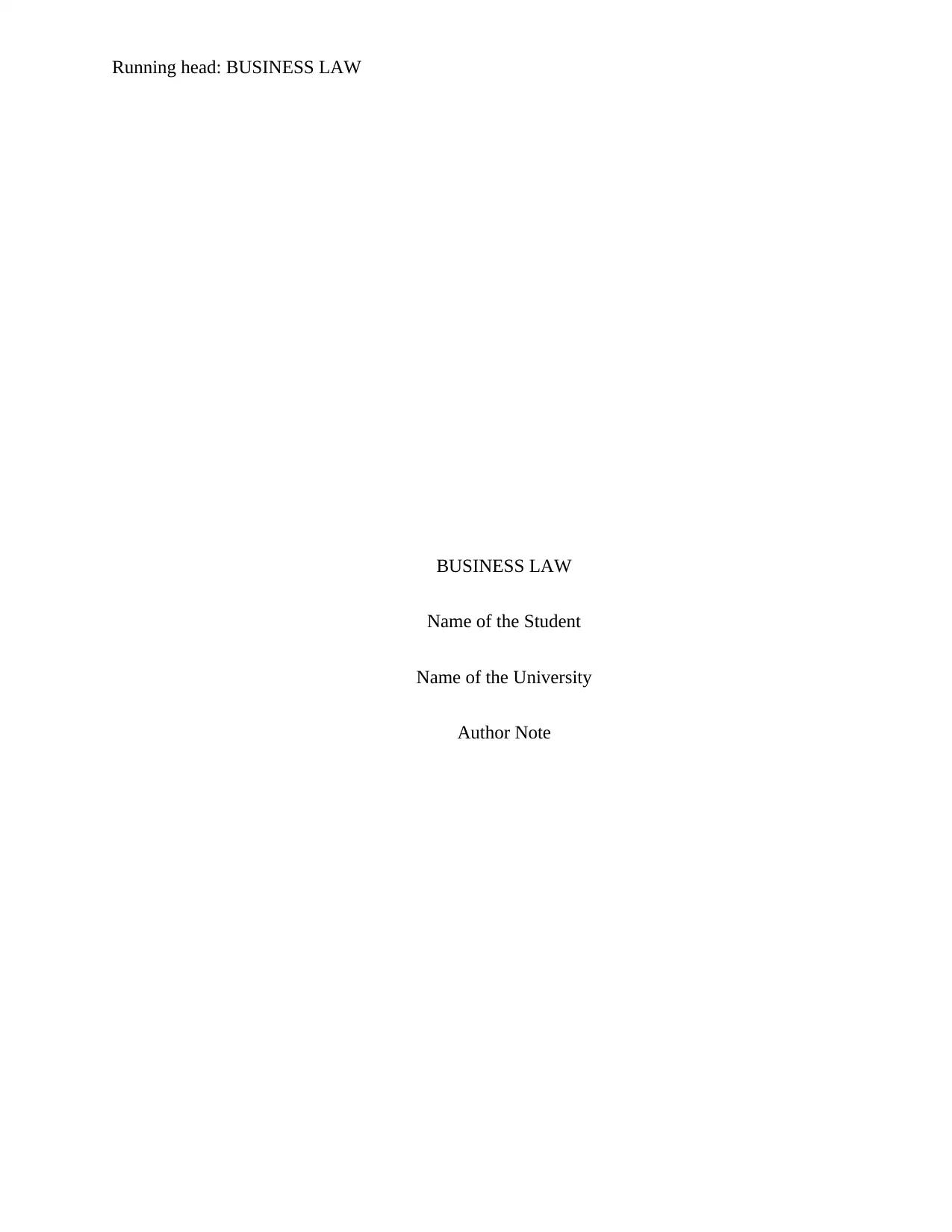
Running head: BUSINESS LAW
BUSINESS LAW
Name of the Student
Name of the University
Author Note
BUSINESS LAW
Name of the Student
Name of the University
Author Note
Paraphrase This Document
Need a fresh take? Get an instant paraphrase of this document with our AI Paraphraser
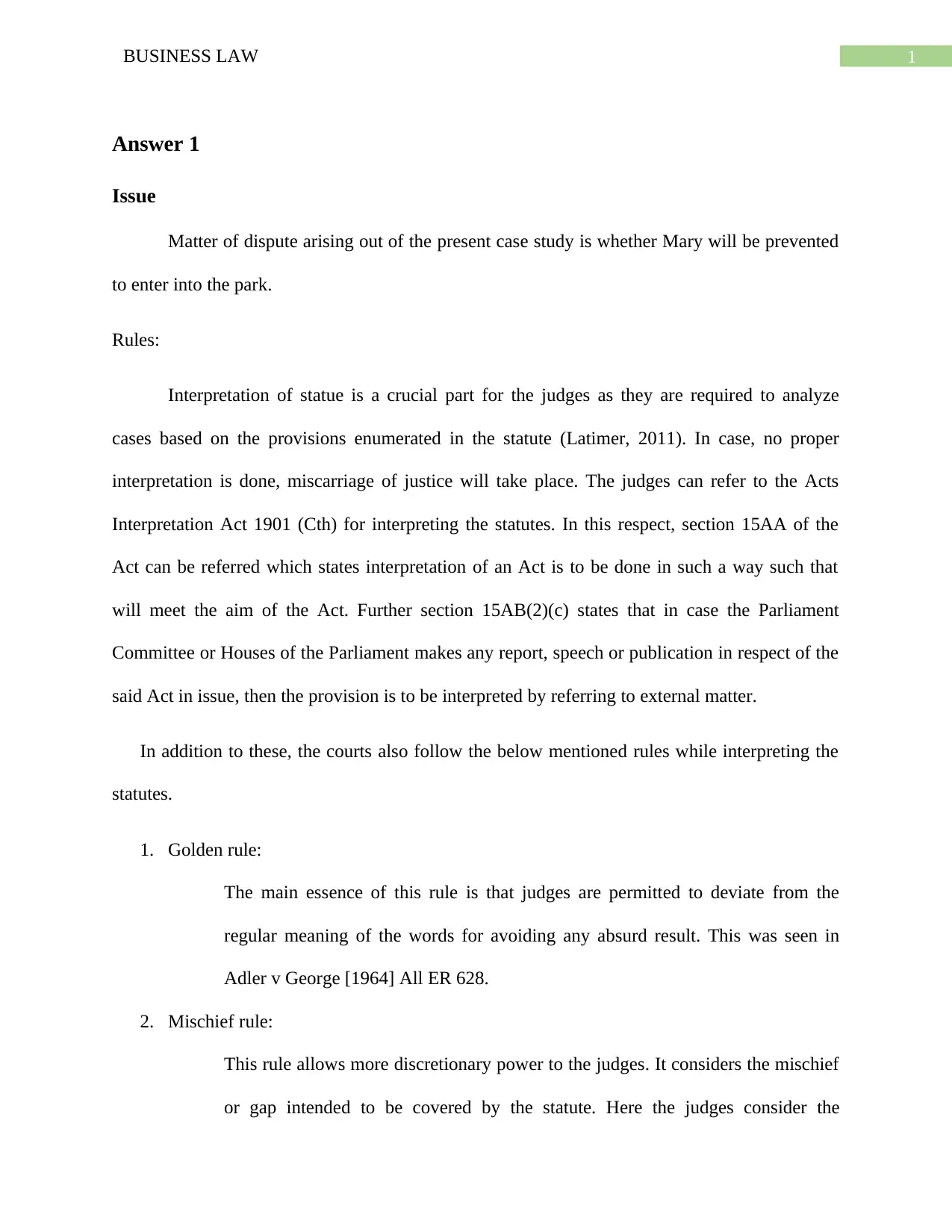
1BUSINESS LAW
Answer 1
Issue
Matter of dispute arising out of the present case study is whether Mary will be prevented
to enter into the park.
Rules:
Interpretation of statue is a crucial part for the judges as they are required to analyze
cases based on the provisions enumerated in the statute (Latimer, 2011). In case, no proper
interpretation is done, miscarriage of justice will take place. The judges can refer to the Acts
Interpretation Act 1901 (Cth) for interpreting the statutes. In this respect, section 15AA of the
Act can be referred which states interpretation of an Act is to be done in such a way such that
will meet the aim of the Act. Further section 15AB(2)(c) states that in case the Parliament
Committee or Houses of the Parliament makes any report, speech or publication in respect of the
said Act in issue, then the provision is to be interpreted by referring to external matter.
In addition to these, the courts also follow the below mentioned rules while interpreting the
statutes.
1. Golden rule:
The main essence of this rule is that judges are permitted to deviate from the
regular meaning of the words for avoiding any absurd result. This was seen in
Adler v George [1964] All ER 628.
2. Mischief rule:
This rule allows more discretionary power to the judges. It considers the mischief
or gap intended to be covered by the statute. Here the judges consider the
Answer 1
Issue
Matter of dispute arising out of the present case study is whether Mary will be prevented
to enter into the park.
Rules:
Interpretation of statue is a crucial part for the judges as they are required to analyze
cases based on the provisions enumerated in the statute (Latimer, 2011). In case, no proper
interpretation is done, miscarriage of justice will take place. The judges can refer to the Acts
Interpretation Act 1901 (Cth) for interpreting the statutes. In this respect, section 15AA of the
Act can be referred which states interpretation of an Act is to be done in such a way such that
will meet the aim of the Act. Further section 15AB(2)(c) states that in case the Parliament
Committee or Houses of the Parliament makes any report, speech or publication in respect of the
said Act in issue, then the provision is to be interpreted by referring to external matter.
In addition to these, the courts also follow the below mentioned rules while interpreting the
statutes.
1. Golden rule:
The main essence of this rule is that judges are permitted to deviate from the
regular meaning of the words for avoiding any absurd result. This was seen in
Adler v George [1964] All ER 628.
2. Mischief rule:
This rule allows more discretionary power to the judges. It considers the mischief
or gap intended to be covered by the statute. Here the judges consider the
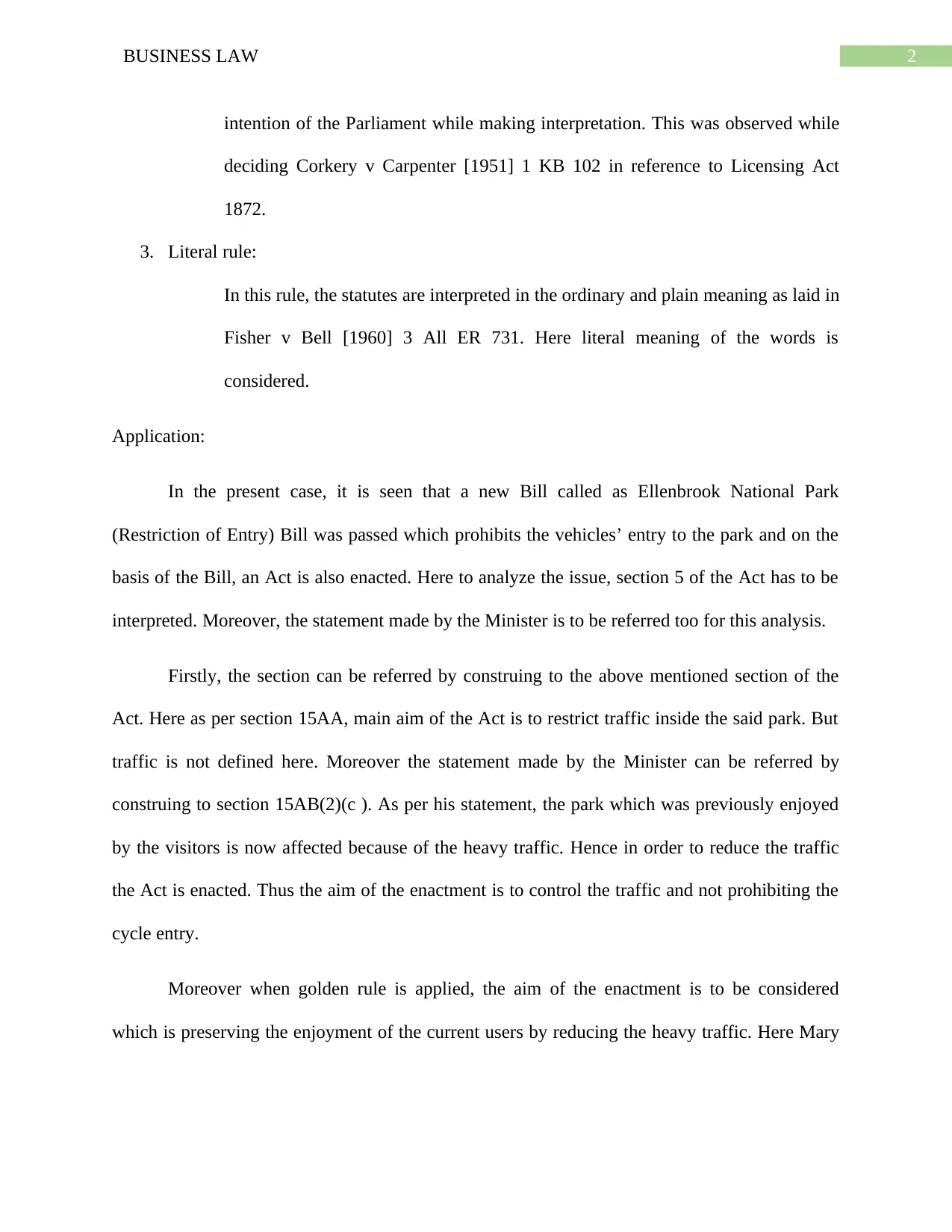
2BUSINESS LAW
intention of the Parliament while making interpretation. This was observed while
deciding Corkery v Carpenter [1951] 1 KB 102 in reference to Licensing Act
1872.
3. Literal rule:
In this rule, the statutes are interpreted in the ordinary and plain meaning as laid in
Fisher v Bell [1960] 3 All ER 731. Here literal meaning of the words is
considered.
Application:
In the present case, it is seen that a new Bill called as Ellenbrook National Park
(Restriction of Entry) Bill was passed which prohibits the vehicles’ entry to the park and on the
basis of the Bill, an Act is also enacted. Here to analyze the issue, section 5 of the Act has to be
interpreted. Moreover, the statement made by the Minister is to be referred too for this analysis.
Firstly, the section can be referred by construing to the above mentioned section of the
Act. Here as per section 15AA, main aim of the Act is to restrict traffic inside the said park. But
traffic is not defined here. Moreover the statement made by the Minister can be referred by
construing to section 15AB(2)(c ). As per his statement, the park which was previously enjoyed
by the visitors is now affected because of the heavy traffic. Hence in order to reduce the traffic
the Act is enacted. Thus the aim of the enactment is to control the traffic and not prohibiting the
cycle entry.
Moreover when golden rule is applied, the aim of the enactment is to be considered
which is preserving the enjoyment of the current users by reducing the heavy traffic. Here Mary
intention of the Parliament while making interpretation. This was observed while
deciding Corkery v Carpenter [1951] 1 KB 102 in reference to Licensing Act
1872.
3. Literal rule:
In this rule, the statutes are interpreted in the ordinary and plain meaning as laid in
Fisher v Bell [1960] 3 All ER 731. Here literal meaning of the words is
considered.
Application:
In the present case, it is seen that a new Bill called as Ellenbrook National Park
(Restriction of Entry) Bill was passed which prohibits the vehicles’ entry to the park and on the
basis of the Bill, an Act is also enacted. Here to analyze the issue, section 5 of the Act has to be
interpreted. Moreover, the statement made by the Minister is to be referred too for this analysis.
Firstly, the section can be referred by construing to the above mentioned section of the
Act. Here as per section 15AA, main aim of the Act is to restrict traffic inside the said park. But
traffic is not defined here. Moreover the statement made by the Minister can be referred by
construing to section 15AB(2)(c ). As per his statement, the park which was previously enjoyed
by the visitors is now affected because of the heavy traffic. Hence in order to reduce the traffic
the Act is enacted. Thus the aim of the enactment is to control the traffic and not prohibiting the
cycle entry.
Moreover when golden rule is applied, the aim of the enactment is to be considered
which is preserving the enjoyment of the current users by reducing the heavy traffic. Here Mary
⊘ This is a preview!⊘
Do you want full access?
Subscribe today to unlock all pages.

Trusted by 1+ million students worldwide
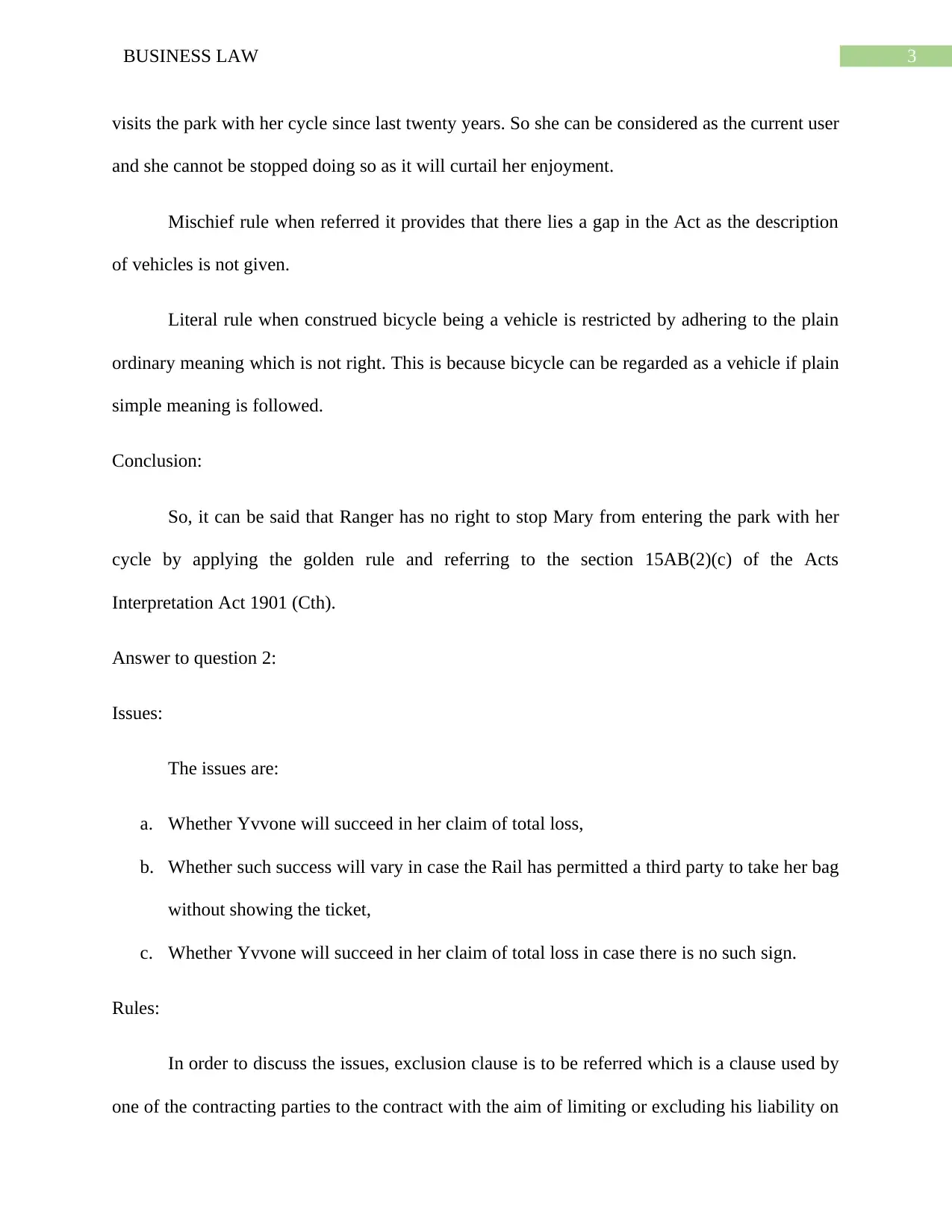
3BUSINESS LAW
visits the park with her cycle since last twenty years. So she can be considered as the current user
and she cannot be stopped doing so as it will curtail her enjoyment.
Mischief rule when referred it provides that there lies a gap in the Act as the description
of vehicles is not given.
Literal rule when construed bicycle being a vehicle is restricted by adhering to the plain
ordinary meaning which is not right. This is because bicycle can be regarded as a vehicle if plain
simple meaning is followed.
Conclusion:
So, it can be said that Ranger has no right to stop Mary from entering the park with her
cycle by applying the golden rule and referring to the section 15AB(2)(c) of the Acts
Interpretation Act 1901 (Cth).
Answer to question 2:
Issues:
The issues are:
a. Whether Yvvone will succeed in her claim of total loss,
b. Whether such success will vary in case the Rail has permitted a third party to take her bag
without showing the ticket,
c. Whether Yvvone will succeed in her claim of total loss in case there is no such sign.
Rules:
In order to discuss the issues, exclusion clause is to be referred which is a clause used by
one of the contracting parties to the contract with the aim of limiting or excluding his liability on
visits the park with her cycle since last twenty years. So she can be considered as the current user
and she cannot be stopped doing so as it will curtail her enjoyment.
Mischief rule when referred it provides that there lies a gap in the Act as the description
of vehicles is not given.
Literal rule when construed bicycle being a vehicle is restricted by adhering to the plain
ordinary meaning which is not right. This is because bicycle can be regarded as a vehicle if plain
simple meaning is followed.
Conclusion:
So, it can be said that Ranger has no right to stop Mary from entering the park with her
cycle by applying the golden rule and referring to the section 15AB(2)(c) of the Acts
Interpretation Act 1901 (Cth).
Answer to question 2:
Issues:
The issues are:
a. Whether Yvvone will succeed in her claim of total loss,
b. Whether such success will vary in case the Rail has permitted a third party to take her bag
without showing the ticket,
c. Whether Yvvone will succeed in her claim of total loss in case there is no such sign.
Rules:
In order to discuss the issues, exclusion clause is to be referred which is a clause used by
one of the contracting parties to the contract with the aim of limiting or excluding his liability on
Paraphrase This Document
Need a fresh take? Get an instant paraphrase of this document with our AI Paraphraser
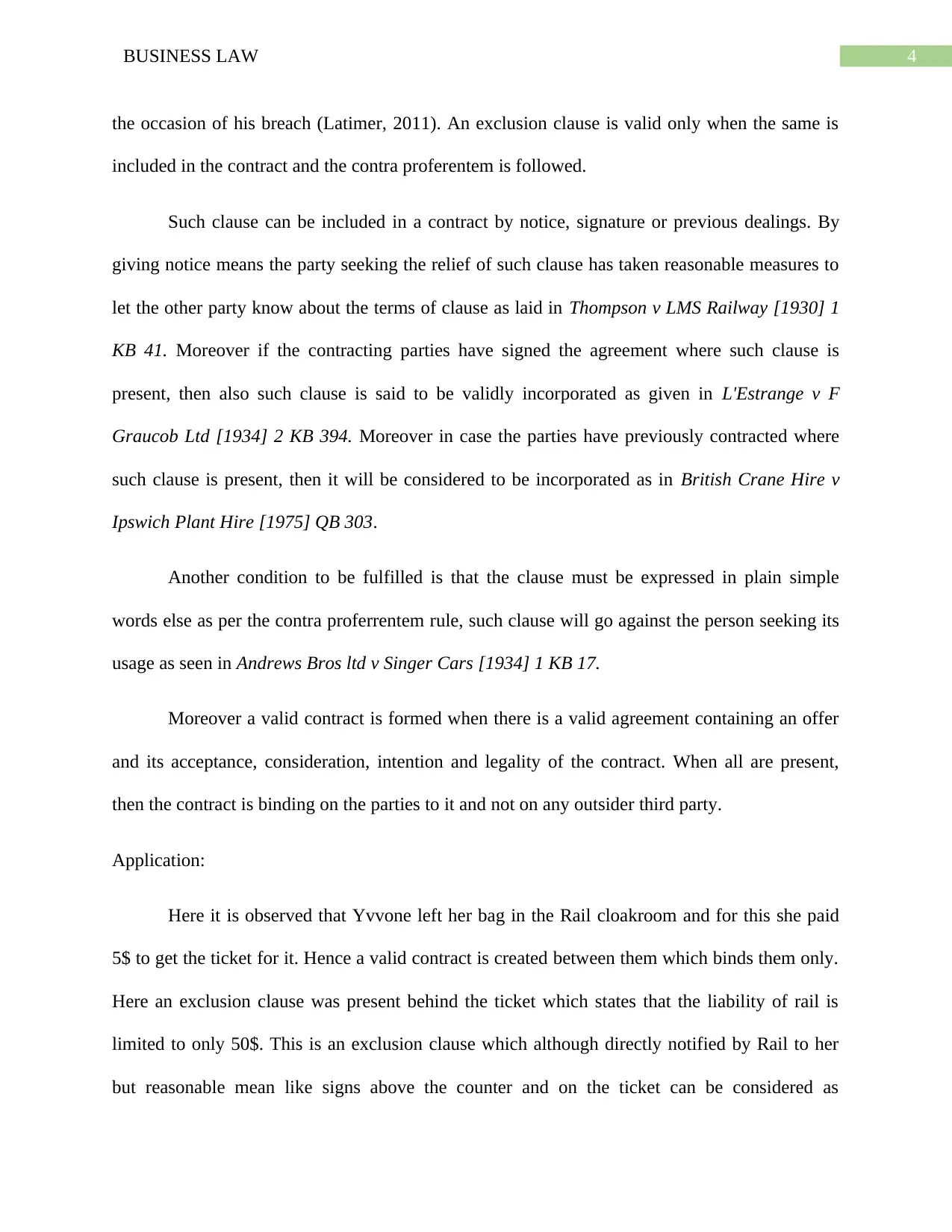
4BUSINESS LAW
the occasion of his breach (Latimer, 2011). An exclusion clause is valid only when the same is
included in the contract and the contra proferentem is followed.
Such clause can be included in a contract by notice, signature or previous dealings. By
giving notice means the party seeking the relief of such clause has taken reasonable measures to
let the other party know about the terms of clause as laid in Thompson v LMS Railway [1930] 1
KB 41. Moreover if the contracting parties have signed the agreement where such clause is
present, then also such clause is said to be validly incorporated as given in L'Estrange v F
Graucob Ltd [1934] 2 KB 394. Moreover in case the parties have previously contracted where
such clause is present, then it will be considered to be incorporated as in British Crane Hire v
Ipswich Plant Hire [1975] QB 303.
Another condition to be fulfilled is that the clause must be expressed in plain simple
words else as per the contra proferrentem rule, such clause will go against the person seeking its
usage as seen in Andrews Bros ltd v Singer Cars [1934] 1 KB 17.
Moreover a valid contract is formed when there is a valid agreement containing an offer
and its acceptance, consideration, intention and legality of the contract. When all are present,
then the contract is binding on the parties to it and not on any outsider third party.
Application:
Here it is observed that Yvvone left her bag in the Rail cloakroom and for this she paid
5$ to get the ticket for it. Hence a valid contract is created between them which binds them only.
Here an exclusion clause was present behind the ticket which states that the liability of rail is
limited to only 50$. This is an exclusion clause which although directly notified by Rail to her
but reasonable mean like signs above the counter and on the ticket can be considered as
the occasion of his breach (Latimer, 2011). An exclusion clause is valid only when the same is
included in the contract and the contra proferentem is followed.
Such clause can be included in a contract by notice, signature or previous dealings. By
giving notice means the party seeking the relief of such clause has taken reasonable measures to
let the other party know about the terms of clause as laid in Thompson v LMS Railway [1930] 1
KB 41. Moreover if the contracting parties have signed the agreement where such clause is
present, then also such clause is said to be validly incorporated as given in L'Estrange v F
Graucob Ltd [1934] 2 KB 394. Moreover in case the parties have previously contracted where
such clause is present, then it will be considered to be incorporated as in British Crane Hire v
Ipswich Plant Hire [1975] QB 303.
Another condition to be fulfilled is that the clause must be expressed in plain simple
words else as per the contra proferrentem rule, such clause will go against the person seeking its
usage as seen in Andrews Bros ltd v Singer Cars [1934] 1 KB 17.
Moreover a valid contract is formed when there is a valid agreement containing an offer
and its acceptance, consideration, intention and legality of the contract. When all are present,
then the contract is binding on the parties to it and not on any outsider third party.
Application:
Here it is observed that Yvvone left her bag in the Rail cloakroom and for this she paid
5$ to get the ticket for it. Hence a valid contract is created between them which binds them only.
Here an exclusion clause was present behind the ticket which states that the liability of rail is
limited to only 50$. This is an exclusion clause which although directly notified by Rail to her
but reasonable mean like signs above the counter and on the ticket can be considered as
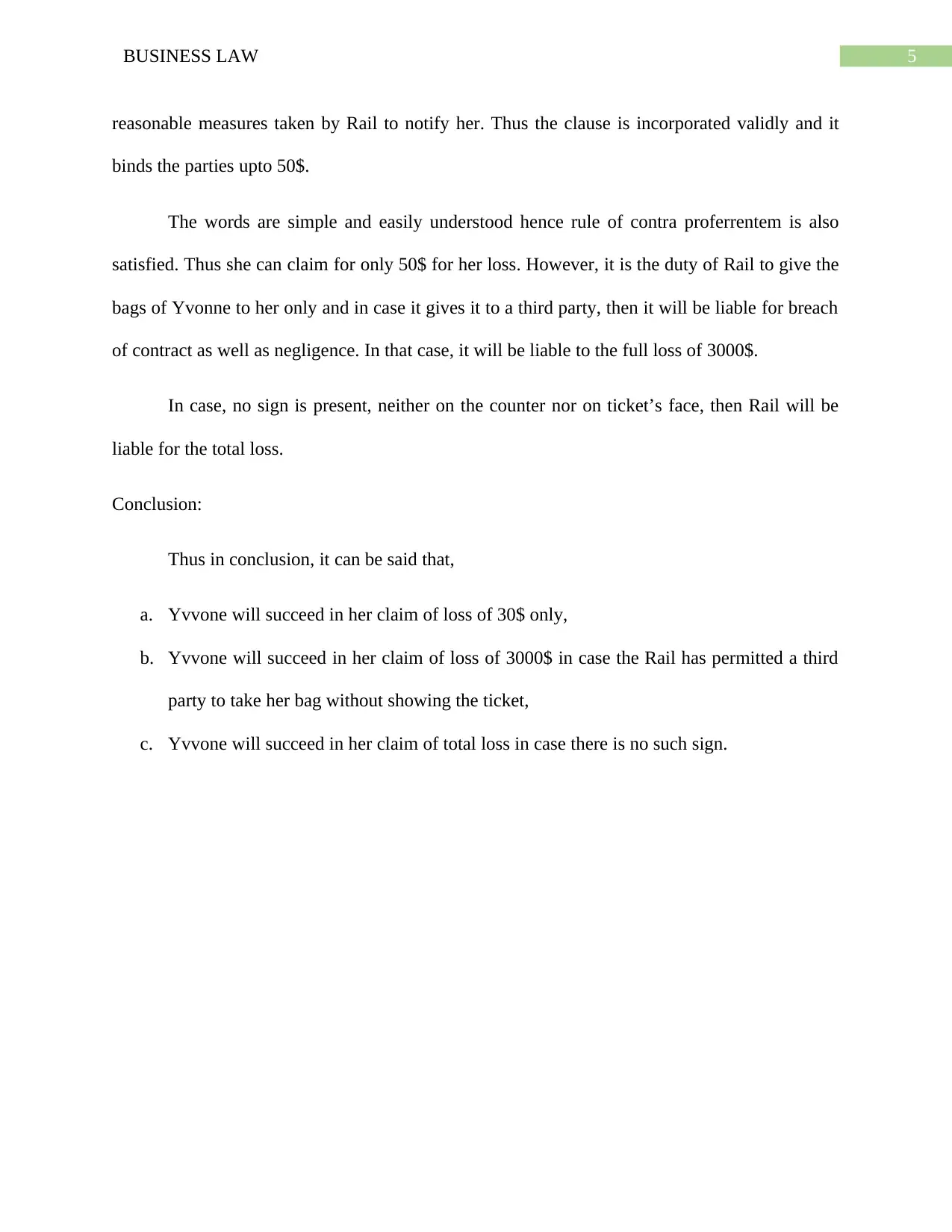
5BUSINESS LAW
reasonable measures taken by Rail to notify her. Thus the clause is incorporated validly and it
binds the parties upto 50$.
The words are simple and easily understood hence rule of contra proferrentem is also
satisfied. Thus she can claim for only 50$ for her loss. However, it is the duty of Rail to give the
bags of Yvonne to her only and in case it gives it to a third party, then it will be liable for breach
of contract as well as negligence. In that case, it will be liable to the full loss of 3000$.
In case, no sign is present, neither on the counter nor on ticket’s face, then Rail will be
liable for the total loss.
Conclusion:
Thus in conclusion, it can be said that,
a. Yvvone will succeed in her claim of loss of 30$ only,
b. Yvvone will succeed in her claim of loss of 3000$ in case the Rail has permitted a third
party to take her bag without showing the ticket,
c. Yvvone will succeed in her claim of total loss in case there is no such sign.
reasonable measures taken by Rail to notify her. Thus the clause is incorporated validly and it
binds the parties upto 50$.
The words are simple and easily understood hence rule of contra proferrentem is also
satisfied. Thus she can claim for only 50$ for her loss. However, it is the duty of Rail to give the
bags of Yvonne to her only and in case it gives it to a third party, then it will be liable for breach
of contract as well as negligence. In that case, it will be liable to the full loss of 3000$.
In case, no sign is present, neither on the counter nor on ticket’s face, then Rail will be
liable for the total loss.
Conclusion:
Thus in conclusion, it can be said that,
a. Yvvone will succeed in her claim of loss of 30$ only,
b. Yvvone will succeed in her claim of loss of 3000$ in case the Rail has permitted a third
party to take her bag without showing the ticket,
c. Yvvone will succeed in her claim of total loss in case there is no such sign.
⊘ This is a preview!⊘
Do you want full access?
Subscribe today to unlock all pages.

Trusted by 1+ million students worldwide
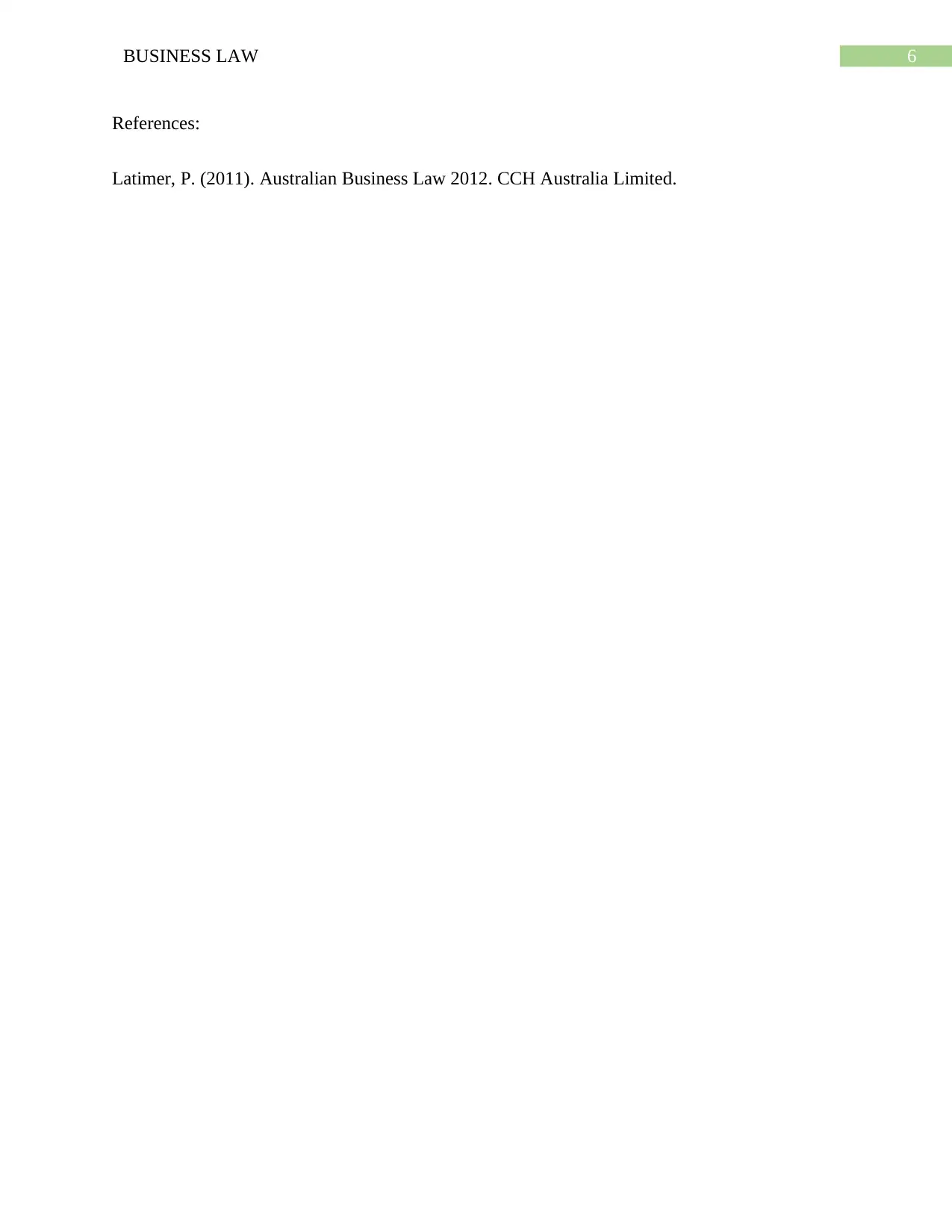
6BUSINESS LAW
References:
Latimer, P. (2011). Australian Business Law 2012. CCH Australia Limited.
References:
Latimer, P. (2011). Australian Business Law 2012. CCH Australia Limited.
1 out of 7
Related Documents
Your All-in-One AI-Powered Toolkit for Academic Success.
+13062052269
info@desklib.com
Available 24*7 on WhatsApp / Email
![[object Object]](/_next/static/media/star-bottom.7253800d.svg)
Unlock your academic potential
Copyright © 2020–2025 A2Z Services. All Rights Reserved. Developed and managed by ZUCOL.





